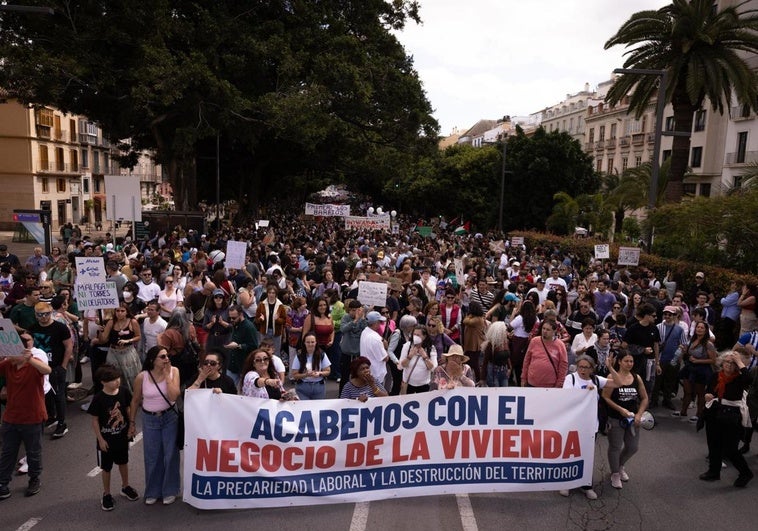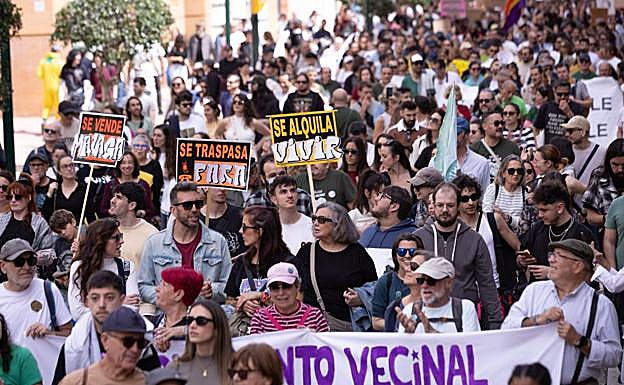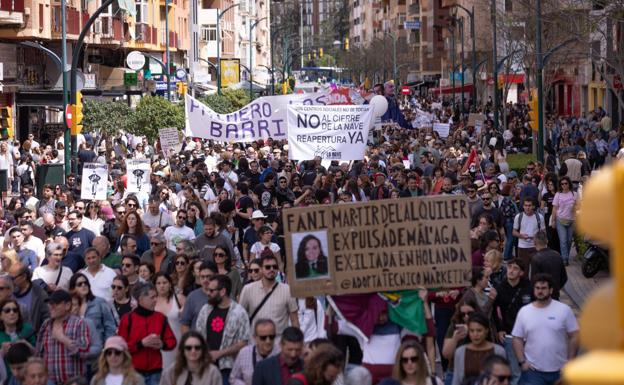
Sections
Highlight
Sections
Highlight

Spanish people and foreign residents of all cultural backgrounds rose again on Saturday 5 April to join the third protest for the right to housing and against its commercialisation. The rally reached 42 cities across Spain, including Malaga, where the housing crisis spreads from the centre all the way to the outskirt neighbourhoods. Like other Spanish cities, Malaga has proved to be too expensive for locals and workers in the capital of the Costa del Sol, to the point where people born there see themselves forced to move somewhere else.
According to the National Police force, around 5,000 people attended the rally in Malaga. However, organisers counted close to 30,000 attendees on Alameda Principal - the main road of the protest. The largest congregation was in the Huelin neighbourhood, where the march ended.
Saturday's rally appeared to have fewer attendees than the ones on 29 June and 9 November, but those participating carried the same messages with the same urgency: "Malaga to live, not to survive"; "Landlord guilt, governmental responsibility"; "Your profit is costing our lives". The protest displayed the depth of the issue, with young and old, families and friends, flatmates and parents all carrying banners. The air of solidarity was thick, with some people attending to look for a solution for family members and acquaintances, regardless of whether the crisis affects them directly.

Málaga para Vivir was, once again, the organisation behind the rally. Beatriz Linares and Kike España celebrated the growth and expansion of the cause, from the epicentre to independent residential organisations. "We went out in more than forty cities at the same time, having coordinated for months and with one main point: we are going to put an end to the housing business. Today the streets are showing that there is widespread dissatisfaction with the way housing is understood as a business," said España, asking people to take the cause in their own hands, with widespread strikes that would get the attention of the government.
España's protest partner, Linares, spoke of the impact of tourism in Malaga. The city flourishes with tourism as much as it suffers from it. In the city centre, eight out of every ten flats are holiday accommodation.

However, the city centre of Malaga is no longer the only area affected by the housing crisis. Neighbourhoods like El Perchel and Huelin have gone from the heart of family and everyday life to yet another tourist amusement park. Locals find it increasingly difficult to put a roof over their heads. Public areas are shrinking.
The protest was not entirely devoid of political presence and attention. The city council representatives that joined the rally highlighted the housing crisis as "one of the most serious problems, not only socially, but also economically". Malaga is inaccessible for many hired professionals who have been asked to move to the city for work.
The spokesperson of the socialist party in Malaga, Josele Aguilar, stated that the capital of the Costa del Sol has some of the highest prices for both buying and renting in Spain.
Aguilar's statements were echoed by other political voices, who highlighted the contradiction between wages and housing prices, with 50% of a salary going towards rent, and the need to establish price caps and curb the plague of tourist housing. Malaga for the people - the simplest message, yet often found disappearing into the void.
Another pain that was addressed during the demonstration was the speed with which new infrastructure appears in the city. New buildings are rarely for residential use, at least not at prices accessible for the wider public.
SUR also attended the demonstration on Saturday, to collect the housing market experiences of the demonstrators.
Marina Martínez and Sandra Rodríguez are 23-year-old flatmates who came to Malaga to study at the university. They were lucky to find somewhere to stay, aware that many people don't get that chance to "win the lottery" - access to housing has become a game of chance.
Tourist guide Lina Castillo reported her internship discovery: "No coastal town offers a flat for less than 900 euros and we are talking about tiny flats." She used to live in Benalmádena, but it became impossible to pay the rent there, so now she shares a flat in Ciudad Jardín.
Quino Cano, Espe Gámez and their baby are one of the many young families that could be seen pushing a pram and marching along each other. The couple went to live in Pizarra, because Malaga became unaffordable for their teacher salaries. Even in the much smaller Pizarra the price of 550 euros used to be unheard of before. Espe said that they wouldn't be able to move to her place of origin - Alhaurín de la Torre - due to towns adjacent to Malaga mimicking similar high prices.

Trini and Héctor, 50, were at the demonstration for their 18-year-old son: "At this rate, he will never be able to access housing; neither he nor many young people. Either you inherit or nothing." In this race for housing, they believe that access is not a question of left-wing or right-wing politics, considering the lack of political willingness to change things. "We've never seen so many hopeless people," the couple said.
Laura Martín, a mental health specialist at the city's Hospital Clínico, said that the inability to afford housing, even with a salary, causes psychological discomfort and leads to deterioration of the mental health state of many patients, who end up either homeless or hospitalised.

The fairytale of an ordinary trajectory of life is a myth not only for young people, who live in shared flats, but also for people who have gone past their mid-30s. Many of them still live with their parents, unable to save up enough for a house or flat of their own. With every penny collected in the savings account, the price of housing goes up, making it impossible to ever achieve the dream.
Publicidad
Publicidad
Publicidad
Publicidad
Esta funcionalidad es exclusiva para registrados.
Reporta un error en esta noticia

Debido a un error no hemos podido dar de alta tu suscripción.
Por favor, ponte en contacto con Atención al Cliente.

¡Bienvenido a SURINENGLISH!

Tu suscripción con Google se ha realizado correctamente, pero ya tenías otra suscripción activa en SURINENGLISH.
Déjanos tus datos y nos pondremos en contacto contigo para analizar tu caso

¡Tu suscripción con Google se ha realizado correctamente!
La compra se ha asociado al siguiente email
Comentar es una ventaja exclusiva para registrados
¿Ya eres registrado?
Inicia sesiónNecesitas ser suscriptor para poder votar.